By Charles Buchanan, UAB Magazine
Media contact: Shannon Thomason, thomason@uab.edu
When Asia Sullivan spent two weeks in Jamaica, the picture-postcard beaches weren’t her first destination. Instead, she and her group headed into Kingston’s urban neighborhoods to spend time in bars and nightclubs talking with locals about prevention of HIV and sexually transmitted diseases.
The trip was a mission of sorts—a journey to learn, research, serve, and gain career experience, all wrapped up into a UAB Education Abroad course. “Our purpose was to study the difference between HIV transmission rates in the Caribbean and in Birmingham,” says Sullivan, a Castleberry, Ala., native who has since graduated from UAB with a bachelor’s degree in public health. The students also adapted successful strategies from UAB’s HIV/AIDS clinic—from helping Jamaican clinics with data entry systems to demonstrating proper condom use in the community.
Sullivan explains that the stigma accompanying HIV and STDs in Jamaica is so great that people will avoid going to clinics associated with those diseases, even if they’re just seeking information. So she and other students promoted prevention in the bathrooms of the nightspots. “It’s private and more secret,” Sullivan says. Locals “could stay under the radar but get the contraceptive devices and lifesaving information they needed.” Though the students obviously stood out, everyone was friendly and interested to hear what they had to say, Sullivan says. She adds that her Jamaican counterparts have had success continuing this approach.
Sullivan’s experience exemplifies the kind of firsthand knowledge that UAB Education Abroad provides through a variety of courses, exchange programs, internships, service learning, and other international travel activities. Students can earn college credit while enjoying unique experiences on every continent—including Antarctica. Whether they travel with UAB faculty, become part of a university community overseas, or live with a host family, each journey makes a lasting impact.
Just ask Brian Johnson, Ph.D., director of UAB Education Abroad. As a junior in college, he spent a semester in Australia, and the experience reshaped his education and career. “That engagement with global citizenship led me to pursue a master’s and Ph.D. in geography and to faculty positions,” he says. “I’m walking, breathing proof of how it can change lives.” Here, a few other UAB travelers share their stories:
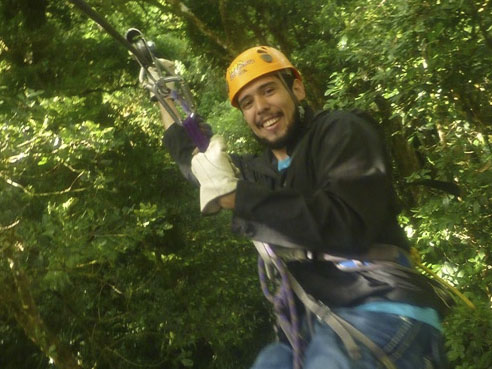 Daniel Mendoza rides a zipline in Costa RicaZiplining Through a Language
Daniel Mendoza rides a zipline in Costa RicaZiplining Through a Language
Daniel Mendoza journeyed to Central America to reclaim a piece of his past. The son of a Honduran family in Hattiesburg, Miss., he wanted to improve his ability to speak, read, and write Spanish. He found a solution in a summer language program in Costa Rica that also emphasized culture and service. Mendoza, a junior biology major and student in the UABTeach program, which prepares science students for K-12 teaching careers, says he felt more of a connection with Spanish by learning it in a place where it surrounded him. “For me to actually understand the language and speak it fluently, I needed to be immersed in the culture,” he says.
Mendoza lived with a host family and attended language classes in the mornings. During his free afternoons, he often took advantage of his school’s cooking and dance classes. On weekends, he and fellow students traveled the country, visiting an active volcano, a coffee plantation, and different beaches. He especially enjoyed ziplining through the rainforest—an adventure that ended with a pulse-pounding Tarzan-style swing hundreds of feet in the air.
For the program’s service component, Mendoza signed up to work in a clinic. Costa Rican health care, like every other aspect of life in the country, operates on “Tico time,” he says. “It’s just a standard that everyone is 15 minutes late, whether it’s for work, a doctor’s appointment, or anything else. Everyone is relaxed, and they take everything at their own pace.” That turns out to be a positive, Mendoza explains, pointing to population statistics that show long life spans in Costa Rica. Physicians there also seem to take more time with each patient than doctors in the United States, which can benefit both physician and patient, he adds.
Mendoza had planned to return to Costa Rica this summer; instead, he’s headed across the Atlantic as a recipient of the William Jefferson Clinton Scholarship. The prestigious award will send him to the American University in Dubai to learn about Middle Eastern culture and the Arabic language. He says his trips abroad are enriching his educational background—which will be useful as he pursues a career in the classroom. “Studying abroad is one of the best experiences I’ve had,” he says.
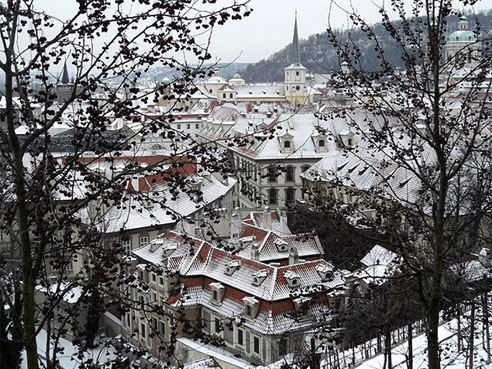 A snow-covered city in the Czech RepublicMaterials That Made History
A snow-covered city in the Czech RepublicMaterials That Made History
No textbook could compare with the historical journey that was the centerpiece of UAB’s Evolution of Engineering Materials course, taught by Amber Genau, Ph.D. For three weeks in the summer, Genau, an assistant professor of materials science and engineering, and her students spent time in Germany surveying thousands of years of manmade materials, from the Stone Age through today. Germany is the perfect spot to do that, she says, because it was a key location for materials in the Roman Empire, and currently is developing “the materials of tomorrow.” The students visited museums, castles, universities, government research labs, companies, and industrial sites including metal casting facilities.
Genau also wanted her students to gain a broader understanding of German life and culture. She asked them to read articles about the country’s economy, recycling programs, and other topics, which sparked discussions about, for example, Germany’s free education system, the nation’s tax rates, and the definition of socialism. “It’s an opportunity to get them to think about this country they are visiting—and then think about their own country in a new way,” Genau says. “It’s an eye-opening experience for them.”
The course’s technical and cultural content help prepare students for a globalized career. “We want engineers who can interact with the global community because so much of engineering is now global,” Genau says. “They might have international clients or international coworkers, and a lot of German companies, like Mercedes, have a manufacturing presence in Alabama and across the U.S.” In fact, she says, one alumnus of the course now works in the Chicago branch of an engineering software company that the students visited in Germany.
“Every time I take the students over there, they all talk about how much they want to go back,” Genau says.
Dinners With the World
Gabrielle Martin, a junior in materials science and engineering, also went to Germany to study a topic that nation excels in: automotive engineering. She took a series of classes in the state of Baden-Württemberg, a center for automobile manufacturing and other industries. “We went to the AMG factory and a Mercedes factory and saw the processes and talked with people who worked there,” says the Gastonia, N.C., native. “It was cool to see what we can do with that sort of degree.”
German language and culture courses supplemented the engineering instruction. But Martin also learned quite a bit about China, Mongolia, and Mexico as well. The program “was designed for international students, and there were about 65 of us from different countries,” she says. In their residence hall, “we had dinners where people cooked foods native to their home country, and we learned how to make the dishes. That was very special.” Martin and her new friends also visited Berlin, Prague, and even the famous CERN (European Organization for Nuclear Research) laboratory in Switzerland.
She also answered plenty of questions about America and the South. The international students “see us as one large country, especially those who have never traveled here,” she says. “It was interesting to hear what they thought of us and then to tell them about our different regions and local cultures.”
Martin isn’t sure whether she will pursue a career in the automotive field, but the experience has already paid off for her. In one of her German classes, she learned how to use a software program that was a key part of a research position she was pursuing. She also is considering returning to Europe for a master’s degree.
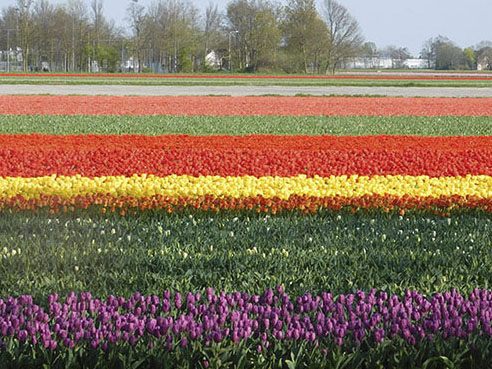 Tulip fields in the NetherlandsRenewing a City
Tulip fields in the NetherlandsRenewing a City
As they learned about sustainability in Amsterdam and Rotterdam, the 17 students visiting the Netherlands with Diane Tucker, Ph.D., and Cynthia Ryan, Ph.D., had Birmingham on their minds.
“We wanted the students to think about problems in Birmingham and bring back ideas that they could implement—or begin to understand the challenges in taking an idea that is successful in one culture and bringing it into another,” says Tucker, UAB psychology professor and director of the UAB Honors College Science and Technology Honors Program. The students focused on issues of food availability in urban settings, sustainable building materials and practices, energy use, and water management, among others. So in Amsterdam, for instance, the group visited a restaurant, supplied by community gardens, that trains teenagers and unemployed adults and serves as a neighborhood gathering spot. They also encountered entrepreneurs who had made an agreement with a local grocery chain to take food nearing its expiration date—meats, produce, and other items that are still good, but otherwise would be thrown away—and provide it to restaurants to make gourmet meals.
Tucker, Ryan—who is an associate professor of English—and the students rode a barge and bicycled through the countryside and the cities, visiting repurposed buildings that had created new communities. “In the Netherlands, if a building is vacant for a year, then someone can squat it,” Tucker says. “That means that someone who will use that space in a productive way can move in and start using it without having to pay for it. We saw several examples where entrepreneurs or artists had settled in abandoned warehouses. Now businesses and restaurants are coming into the area.” Another surprising sight: shipping containers that had been reworked into housing units, complete with plumbing and utilities, for students.
Back in Birmingham, some of the students are applying what they learned, developing a project to encourage local grocery stores to sell bruised or malformed fruits and vegetables at reduced prices. Another student wants to use community gardens as an educational platform for children. Others have taken up bicycling for transportation instead of recreation.
The students “appreciated that they were living the way that people in the Netherlands do” during their trip, Tucker says. “If you go with an open mind and try to understand another culture, then it helps you take a more nuanced look at your own situation and your own choices.”
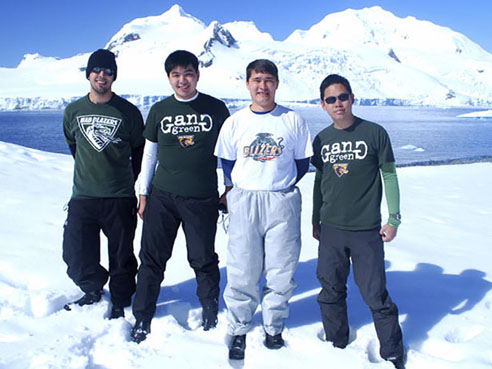 UAB Education Abroad students in AntarcticaCold Truths
UAB Education Abroad students in AntarcticaCold Truths
Students get to meet local residents on every Education Abroad trip, but they’re especially eager to do it on journeys led by James McClintock, Ph.D. That’s because the locals include 50,000 Adelie penguins that greet students on their first day in Antarctica.
The epic trip is part of a course focusing on Antarctic marine ecology. McClintock, UAB’s Endowed University Professor in Polar and Marine Biology, has led scientific expeditions to Antarctica for more than 30 years; a point of land there is even named for him. He first took UAB undergraduates about a decade ago when he began leading Abercrombie & Kent educational cruises to the icy continent. Along the way, students attend lectures from other scientists on the cruise and collect data such as seawater temperature. As that water gets colder, it becomes richer with nutrients, attracting birds, whales, and other hungry animals.
On land, students gain “an immediacy with researchers in the field,” McClintock says. He takes them to Palmer Station, where he works, and introduces them to his colleagues. “They learn how science is performed there and how the station is run in a remote environment,” McClintock says. “They also learn about cutting-edge research into the effects of climate change and ocean acidification on animals that have adapted to live in an extreme environment.”
That science, along with the breathtaking scenery, “changes you,” he explains. “When you come back, you become an ambassador for Antarctica.” Throughout the journey, the students keep natural history notebooks, writing about the ecology of animals and plants they encounter. They turn them in at the end of the course, and once he has reviewed the notebooks, McClintock returns them to the students—as a souvenir they created themselves. “It will be something they will keep their whole life and love, I’m sure,” he says.
Watch Your Step
In the Galapagos Islands, you have to be careful not to tread on the animals, says Ken Marion, Ph.D., professor emeritus of biology. “It’s a bizarre place where the animals have no fear because they’ve never had any predators,” he explains. For more than two decades, Marion and fellow biology professor McClintock have led student trips to the Galapagos, along with the coral reefs of the Bahamas and the tropical rainforests of Costa Rica.
“We target three great ecosystems and show them fauna and flora that they haven’t seen before,” Marion says. “They get an appreciation of how these big ecosystems work—how everything ties together.” He enjoys the looks on his students’ faces as they watch sea turtles hatch or monkeys play. “These are things you just don’t see in Alabama,” he notes. Along the way, the students also gain cultural and historical perspectives and talk with local people about their views on everything from global environmental problems to politics. Students also write about their discoveries and experiences in field notebooks when they return.
The course’s alumni have pursued careers in fields ranging from health care to the environment, and some of their children are now second-generation travelers with Marion and McClintock. The trips “broaden your perspective,” Marion says. “You may not necessarily recall the basic biology course you took, but you are always going to remember studying abroad.”
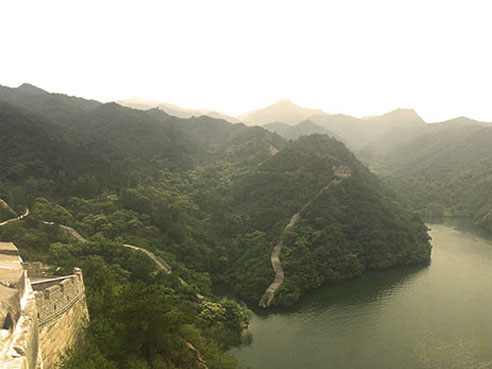 A view from the Great Wall of ChinaAdvice from the Road: What to Know about Studying Abroad
A view from the Great Wall of ChinaAdvice from the Road: What to Know about Studying Abroad
1. It’s affordable: A semester abroad essentially replaces a semester at UAB, meaning that students don’t pay any additional tuition, Johnson says. Housing costs can vary, depending on destination, but most are comparable to those in Birmingham—or sometimes cheaper. UAB scholarships also apply to overseas study, and students should check out a number of UAB and external scholarships designed specifically for study-abroad opportunities.
2. Plan ahead: “Study abroad can fit into any major,” Johnson says. “If you start planning early, then you should graduate on time. We make sure that students get academic credit that comes back to UAB and helps them advance toward their degrees.” Some trips take place during winter, spring, or summer breaks, making them easy to fit into busy schedules. Johnson encourages students to begin thinking about overseas study as freshmen for travel during their sophomore, junior, or senior years. That provides plenty of time to review options and complete all preparations. Education Abroad will even help them secure a passport and visas.
3. Research your destination: Students should learn about the places they’ll be visiting to help reduce culture shock when they arrive. In much the same way that Birmingham isn’t New York or Los Angeles, not all of France is like Paris, for instance. Look beyond the national stereotypes, advises Sullivan, who spent most of her time in Jamaica in urban Kingston, away from the famous tropical beaches. Also, while it’s not required that students speak a country’s language in order to visit it, learning key words and phrases can be beneficial.
Johnson adds that UAB sends students only to cities and countries that have a high degree of safety.
4. Immerse yourself in the culture: “You are in someplace new that you may never return to, so try to squeeze the most out of every day and every experience,” Genau says. She recalls being startled one day in Germany as she looked out the window and saw a man riding a white horse, trailed by a parade of children carrying paper lanterns. She followed them to a bonfire in the center of town and unexpectedly found herself in the middle of a holiday celebration that’s unknown in the United States. It became an experience she treasures, she says.
Traveling also offers opportunities to take a new look at America. When he was a student in Australia, Johnson took a U.S. history course and saw a completely different view of his home country. Talking with people overseas about America “helps students to step out of their own context, become more self-reflective, and learn how the rest of the world perceives their country and culture.”
“We’ve had students who have never flown; we’ve had students who have never been out of the country,” McClintock says. “They come back just glowing. You can see it in their eyes. They’ve seen a bit of the world, and it has changed their perspective. That’s absolutely priceless.”